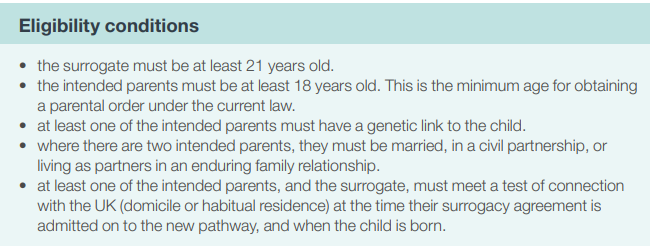Considering surrogacy?
As the intended parents, the current pathway to legal parenthood can often be long and complicated. But hopefully, this won’t be for much longer.
Now recognised as a legitimate way to build a family, the use of surrogacy has increased significantly in recent years. Yet despite this increase, surrogacy laws – which date back over 40 years – have failed to keep pace and are no longer in the best interests of any of the parties involved.
That’s why, earlier this year, the Law Commission of England and Wales and the Scottish Law Commission, published a set of reforms designed to tackle this problem.
A new ‘pathway to parenthood’ was recommended, which aims to improve the outdated law, address its main issues, and offer more clarity, support and safeguards throughout the process. Hopefully, making things a little easier for everyone involved – particularly the parents-to-be.
Here we take a closer look at the proposed changes and how – here at St Helens Law – our specialist family law solicitors can assist in your personal surrogacy journey.
Problems with the current surrogacy laws
And how the reforms intend to fix them.
1. Delayed legal parenthood
Under current surrogacy law, the intended parents are not the legal parents from birth.
Officially, the surrogate takes this responsibility until a parental order is obtained – which can take between 6 to 12 months. During this time, the intended parents have no legally recognised relationship with the child. And as such, cannot make any decisions in respect of the child – e.g. regarding their medical treatment.
Under the new pathway, however, this wouldn’t be the case.
Providing certain conditions are met (which are listed below), the intended parents would become the child’s legal parents from birth. And if the surrogate withdraws consent within the first 6 weeks, she would then need to apply for a parental order to gain legal parental status instead.

2. Lack of safeguards for all parties
Currently, there is no formal legal assessment of a surrogacy agreement until a parental order is applied for. And at this point, it’s often too late for any reservations to be dealt with properly. The child has already been born and – in their best interests – the court will invariably grant the order.
By contrast, the new pathway introduces a number of ‘pre-conception safeguards’, including:
- a medical screening of the surrogate and intended parents
- independent legal advice from specialist surrogacy solicitors
- an assessment of the welfare of the child to be born
- implications counselling
- enhanced criminal record checks
- a signed Regulated Surrogacy Statement
State regulation would therefore come before, not after, the birth – and as such, the pathway offers an appropriate level of protection for everyone and ensures the safety and welfare of the child.
3. Unclear rules on payment
When it comes to money, surrogacy laws are unclear and difficult to enforce.
By law, payments can only be legally made to the surrogate for ‘expenses reasonably incurred’. But there’s no definition of what classes as a reasonable expense. And when the law isn’t followed, all the court can do is refuse to grant the parental order – which isn’t in the best interests of the child.
To help rectify this issue, the new surrogacy reforms set out clear categories of permitted payments – such as medical and well-being costs, lost earnings, pregnancy support and travel – and those which are strictly prohibited, such as payments for carrying the child and the surrogate’s living expenses.
4. Problems with international surrogacy arrangements
Due to the current issues with surrogacy laws in the UK, intended parents often choose to take the international route instead – undertaking a surrogacy agreement in a different country, where they’re offered greater certainty and are recognised as the legal parents from birth.
This is understandable. But in many cases, it means the child can face a long wait – in a foreign country away from their intended parents – for legal documentation to enter the UK.
The new pathway is hoped to dissuade couples from taking this route in the first place.
However, it also includes a recommendation to help intended parents bring their child – born to a surrogate mother overseas – home to the UK as quickly as possible, avoiding any unnecessary delays. For example, by allowing them to start the application for passports and visas before birth.
5. No access to origins
Everyone should have the right to access information about their origins. But currently, surrogate-born children do not have the adequate framework to learn about their genetic background.
As part of the suggested reforms, a new surrogacy register would therefore be created.
This will hold detailed information about the surrogate mother and the intended parents, therefore giving children born through surrogacy the opportunity to trace their origins when they’re older.

Need legal advice on surrogacy?
This proposed pathway certainly holds the best interests of the child at heart, and would be a positive step for everyone involved in the surrogacy. However, at the time of writing, the UK government is yet to make the recommendations law – and it’s unclear when this will happen.
So what about if you’re keen to build a family right now?
Surrogacy law is a highly complex (and emotive) area. Whether you’re opting for traditional or gestational surrogacy, in the UK or abroad, it’s crucial that you seek independent legal advice before entering an agreement. And here at St Helens Law, we can help.
Our family law solicitors have recognised expertise in this area, including a thorough understanding of the surrogacy process (for both domestic and international arrangements) and how to apply for a parental order. And it would be our privilege to guide you through the surrogacy, bringing your child home as quickly as possible and ensuring you’re recognised as the legal parents.
An initial consultation with our surrogacy solicitors is available free of charge. So if you have any questions about surrogacy law or would like advice on the best way to proceed as the intended parents, why not get in touch and arrange a time and date that works for you?
Sound surrogacy legal advice is just a phone call away. Give us a call on 01744 742360. Or if you prefer, fill out the online form on this page and a member of our family law department will respond as soon as possible with further information.


